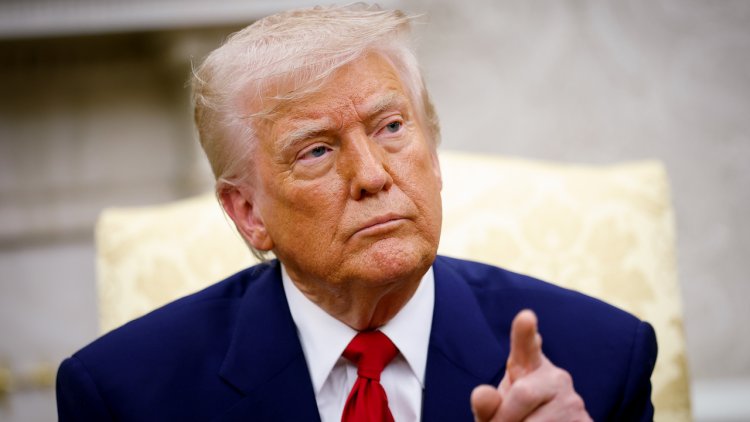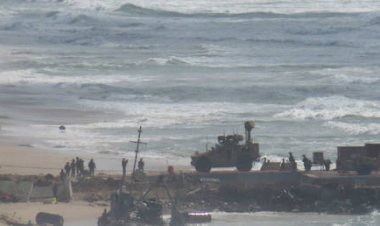Trump announces US has commenced direct negotiations with Iran
The U.S. and Israel maintain that Tehran is unable to acquire nuclear weapons.

“I think if the talks aren’t successful with Iran, I think Iran is going to be in great danger,” Trump stated during a press conference in the Oval Office. “And I hate to say it, great danger, because they can't have a nuclear weapon.”
Trump made this announcement alongside Israeli Prime Minister Benjamin Netanyahu amidst ongoing tensions, as Iran has expressed reservations about direct negotiations with the U.S. to address its nuclear activities. Tehran has not confirmed the scheduled meeting, and there was no response from the Iranian mission to the United Nations regarding requested comments.
Last month, Trump disclosed that he had sent a letter to Iran’s supreme leader Ayatollah Ali Khamenei, suggesting direct negotiations surrounding the nation’s nuclear program. As part of Netanyahu’s visit, two individuals briefed on the discussions noted a focus on aligning military strategies to address Iran’s nuclear sites should Trump’s diplomatic efforts falter. These sources spoke on condition of anonymity due to the private nature of the discussions.
Netanyahu, who was present during Trump’s remarks, echoed similar sentiments regarding the consequences if diplomatic efforts fail.
“If it can be done diplomatically in a full way the way it was done in Libya, I think that would be a good thing,” Netanyahu asserted. “But whatever happens, we have to make sure that Iran does not have nuclear weapons.”
Trump’s assertive approach toward Iran has ignited significant debate within the MAGA movement about the trajectory of the administration’s foreign policy and the implications of potential military involvement in the Middle East.
The administration has seen appointments of several noted Iran hawks, including national security adviser Mike Waltz and Secretary of State Marco Rubio, along with voices advocating for a de-escalation of military commitments in the region. Tensions over differing viewpoints have become pronounced, which could influence U.S. relations with Israel and its initiatives against Iran.
There is substantial concern among influential figures outside the government regarding Trump’s recent threats to Iran. Conservative commentator Tucker Carlson cautioned on social media, stating, “Now is the worst possible time for the United States to participate in a military strike on Iran. Nothing would be more destructive to our country. And yet we’re closer than ever, thanks to unrelenting pressure from neocons. This is suicidal. Anyone advocating for conflict with Iran is not an ally of the United States, but an enemy.”
Iran has previously dismissed the possibility of negotiations with Trump; Iranian Foreign Affairs Minister Abbas Araghchi referred to the idea of direct nuclear discussions as “meaningless.” He emphasized that Iran prefers indirect diplomacy and questioned Trump’s stance: “If you want negotiations, then what is the point of threatening?”
Israeli officials remain cautious, fearing that if Iran eventually agrees to talks, it could merely serve to delay action while strengthening its nuclear capabilities. This could also provide a temporary reprieve for Iran to recover from the losses incurred by Israeli strikes against its proxy groups in the region, such as Hamas in Gaza, Hezbollah in Lebanon, and Houthi militants in Yemen.
During his first term, Trump withdrew from the Iran nuclear deal, an agreement he had often criticized, which had previously placed limits on Tehran’s nuclear activities in exchange for sanctions relief.
Now, he faces the challenge of balancing new diplomatic overtures with Tehran with the potential consequences of military action if negotiations break down.
“Trump would like to avoid two things,” remarked Aaron David Miller, a Middle East policy expert at the Carnegie Endowment for International Peace. “Number one: Iran crossing the nuclear threshold on his watch. And number two, a major military operation by the U.S. or Israel that plunges the region into chaos.”
Currently, Iran is at a critical juncture regarding its nuclear capabilities. According to the U.N. nuclear watchdog, Iran produced nearly 275 kilograms of uranium enriched to 60 percent in February, approaching the 90 percent threshold necessary for weapons-grade material. A recent U.S. intelligence assessment released by the Office of the Director of National Intelligence noted that while “Khamenei has not reauthorized the nuclear weapons program,” there is an indication that “pressure has probably built on him to do so.”
Sanya Singh for TROIB News












